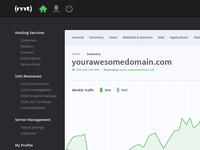

MariaDB 10.3.22 for both Plesk database and customer websites. The following versions are included in Plesk distribution packages: MariaDB 10.11 is supported starting from Plesk Obsidian 18.0.52. MariaDB 10.6 starting from Plesk Obsidian 18.0.41. MariaDB 10.4 and 10.5 starting from Plesk Obsidian 18.0.30. worker, event, not prefork) and move PHP out-of-process with FastCGI.Which MariaDB versions are supported by Plesk? Answer I'm not necessarily advocating the use of Nginx - you could probably do it with Apache too, if you run a different MPM (Multiprocessing module e.g. A typical implementation of a better architecture, would be Nginx + PHP/FastCGI. A better architecture would be one where you don't waste "fat" processes doing nothing. Note that keepalives are VERY good for performance, particularly on HTTPS.Ī "better" solution would be to switch to a better architecture. HTTP keepalives, if turned on, also keep child processes in use.Ī "bad" solution would be to turn off keepalives (or maybe reduce the keepalive time). Serving static files over slow connections, keeps child processes in use for a long time for no reason. PHP causes the apache child processes to use lots of memory each. just in case something unexpected goes wrong.Īlmost certainly your machine is running out of memory because you have too many "fat" Apache processes doing little or no work.Īpache normally uses a "prefork" model. I would certainly configure very generous Swap Space, perhaps even 40.60GB. If I had a server with 18GB RAM and it's running MongoDB for example (which is very RAM intensive). On a production server, there is really no reason not to use generous swap. Somebody said: "if your system filled up 18GB and is swapping onto 20GB, then you have bigger problems"Ĭertainly true, but having generous Swap Space if unexpected things go wrong, will save your server and the processes on it from crashing completely! You might still be able to log in, examine the system while it's still running (slowly), and repair things (albeit slowly), and not have to reboot. I'll add a comment here, because ppl are complaining that I quote the old rule: " 1.2-times RAM size = Swap size "Ī 2TB SATA drive costs around $70 these days, that means 20GB costs you about 70 cents - it's dirt cheap! I know 20GB sounds a lot, but think of it as a very inexpensive "worst case insurance"! Once you enable the swap space with sudo swapon -a, you should see it listed in top and with swapon -s, and your system should behave much more nicely.Īs this question was migrated to ServerFault. then format that swap partition or swap file to make it usable for swapping with the mkswap command. Or create a swap file (if you don't have disk space left to partition this is also a good option if you later find out that you need more swap than you anticipated) I'd say if you have 18G RAM, configure ~20.30G Swap - don't be stingy with the Swap, because "disk is dirt-cheap"!ĭisclaimer: there are a few exceptions when you can live without swap, but on the other hand, configuring and not needing it does not hurt! :)Įither create a swap partition, preferably on your fastest disk partition (best choice or add a flash drive to your physical server) this will not show any output if no swap is configured.Īs a rule of thumb, configure Swap Space approximately 1.2 times the size of your physical memory. You can also check the swap configuration by running swapon -s. To check your memory and swap space in use, you can run free -k. If you don't have swap space, really bad things will happen, because your system will run out of places (RAM) where to create new processes - it can not put them in swap, because there is none, so you will see extremely high loads, the system freezing up, and processes die seemingly inexplicably. On any UNIX system, you do need swap space - because that is where processes live while they are not scheduled on one of the CPUs. Disk is cheap! add a generous swap partition! :-) or worst case you can also create a swap-file later. that is a very bad thing! especially in production. Really bad things happen if your UNIX system runs out of RAM and doesn't have Swap.

In general, you should always have a sufficient swap space on a UNIX system! Swap-size = 1.2-times RAM size is a good idea. that means that you do not have any Swap Space configured.

Looks like you have 18G physical memory, but zero swap space., e.g. What does tail -f /var/log/messages say when you experience high system loads?Īre your processes very I/O or very CPU intensive?







 0 kommentar(er)
0 kommentar(er)
